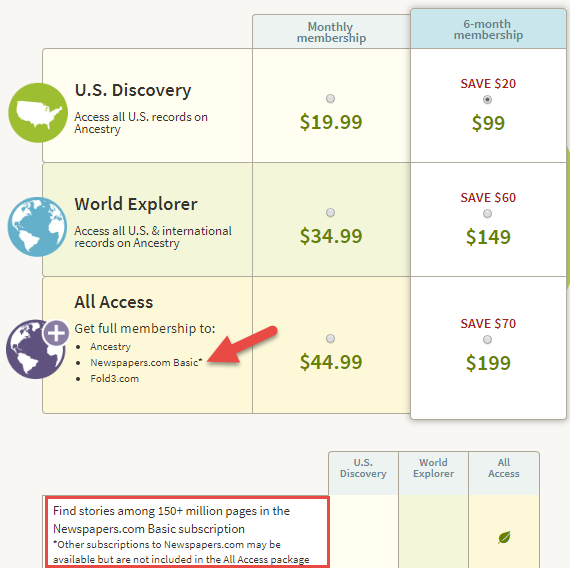US Church Records for Genealogy and More Now Online
Using US church records for genealogy can help you solve brick walls in your family history research. Now online: Swedish-American, Presbyterian, Catholic and Methodist! Also: Connecticut newspapers, NY passenger lists, and vital records from Michigan, Montana, New...Comparing Digitized Newspapers on Genealogy Websites: Why Findmypast.com Gets a Headline
When it comes to digitized newspapers on genealogy websites, Findmypast is a clear headliner. The site already hosts millions of U.S., British, and Irish newspaper pages–and their British collection is about to DOUBLE. Extra, extra, read all about it!
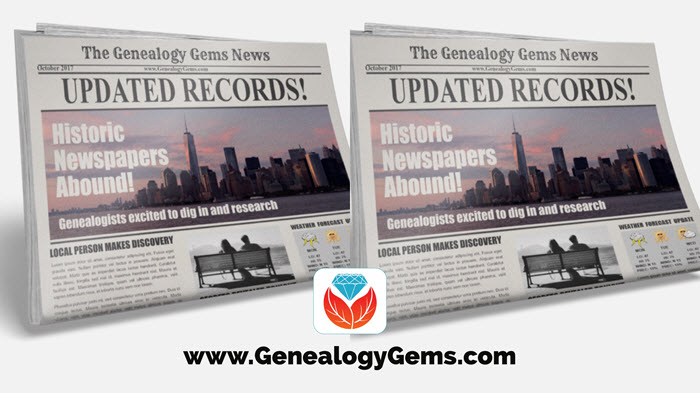
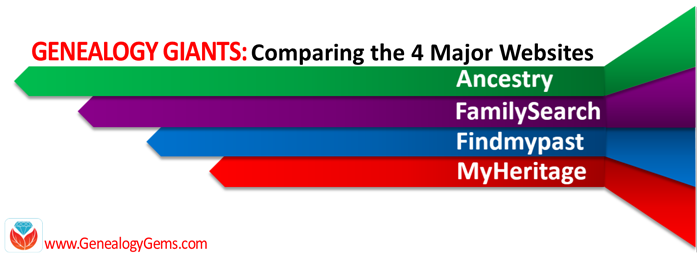 Here at Genealogy Gems, we regularly compare features of leading genealogy websites, or as we refer to them, the “Genealogy Giants:” Ancestry.com, FamilySearch, Findmypast and MyHeritage. Today’s topic: digitized newspapers.
Here at Genealogy Gems, we regularly compare features of leading genealogy websites, or as we refer to them, the “Genealogy Giants:” Ancestry.com, FamilySearch, Findmypast and MyHeritage. Today’s topic: digitized newspapers.
It may surprise you to hear that digitized historical newspapers aren’t a big part of the collections at all four giant genealogy websites. In fact, only one site–Findmypast–offers access to millions of exclusive British and Irish newspaper pages and a major U.S. newspaper database (which is usually just available at libraries).
Why mention it now? Because a good thing just got better: Findmypast plans to double its British newspaper content over the next two years.
Digitized Newspaper Treasures at Findmypast.com
 Findmypast’s enormous genealogy collections focus on the countries of England, Scotland, Ireland, and Wales. Findmypast and The British Library have been working together for several years on The British Newspaper Archive, now home to more than 22.5 million newspaper pages dating from the 1700s. But what many people might not realize is that these same newspaper pages are also available to Findmypast subscribers.
Findmypast’s enormous genealogy collections focus on the countries of England, Scotland, Ireland, and Wales. Findmypast and The British Library have been working together for several years on The British Newspaper Archive, now home to more than 22.5 million newspaper pages dating from the 1700s. But what many people might not realize is that these same newspaper pages are also available to Findmypast subscribers.
You can search newspaper pages on Findmypast by name (first and last) and by other keywords, such as an occupation, street address, event or another word that might be associated with your family in newspaper articles. You can narrow the date range of papers searched and even target specific newspapers:
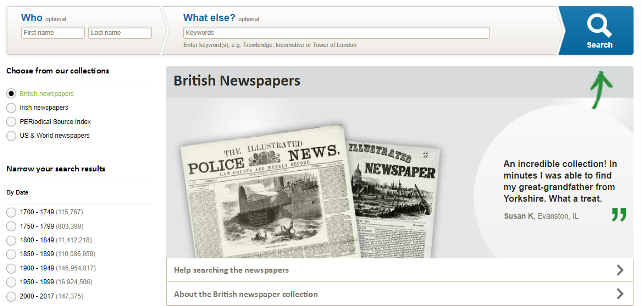
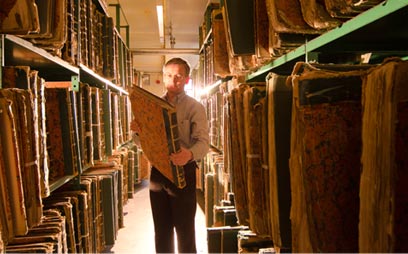
Original bound newspaper volumes at the British Library. Image from The British Newspaper Archive.
And it gets better. Findmypast just announced that over the next two years, it will nearly double its digitized newspaper collections! It is scanning over 12 million pages from the largest private newspaper collection in the UK: the Trinity Mirror archives. Over 150 local papers from across the U.K. are included. These pages have never been made available online, but will be on both The British Newspaper Archive and Findmypast. The project is already underway and moving along rapidly: up to 100,000 pages per week.
According to a press release, “The program builds on an existing partnership that has already resulted in the digitization and online publication of upwards of 160 Trinity Mirror titles, including significant coverage of both World Wars. Published online for the very first time, these war-time publications also included the Archive’s first national titles, The Daily Mirror and The Daily Herald.”
 TIP: If you are interested in accessing British newspapers, but not needing the full range of genealogy resources offered at Findmypast, consider purchasing PayAsYouGo credits from Findmypast. You can purchase 60-900 at a time and “spend” them to view individual search results, including newspapers. You can also subscribe separately to The British Newspaper Archive.
TIP: If you are interested in accessing British newspapers, but not needing the full range of genealogy resources offered at Findmypast, consider purchasing PayAsYouGo credits from Findmypast. You can purchase 60-900 at a time and “spend” them to view individual search results, including newspapers. You can also subscribe separately to The British Newspaper Archive.
More Digitized Newspapers on Genealogy Websites
The other giant genealogy websites do offer some newspaper content–indexed, imaged, or both. Here’s a short summary of what you’ll find on Ancestry.com, FamilySearch, and MyHeritage:
Ancestry.com: This giant site does offer some digitized newspaper content, including images connected to indexed names in Historical [U.S.] Newspapers, Birth, Marriage, & Death Announcements, 1851-2003, Australia’s New South Wales Government Gazettes, 1853-1899 and Canada’s Ottawa Journal (Birth, Marriage and Death Notices), 1885-1980. But Ancestry.com’s biggest newspaper collections are mostly indexed obituaries (not images of the actual newspaper pages). Ancestry.com subscribers who want major access to digitized newspapers should consider upping their subscription to “All Access,” which includes Basic access to Newspapers.com.
FamilySearch: Millions of indexed obituaries are searchable by name on its free website, but it doesn’t generally offer any digitized newspaper pages. Of its billion+ historical record images, FamilySearch prioritizes more “core” genealogical records, such as vital records, censuses, and passenger lists.
MyHeritage.com: This site used to have access to NewspaperARCHIVE, the same U.S. newspaper database Findmypast currently offers, but it doesn’t now. It’s got new collections of Ohio (4.5 million pages from 88 sources) and New York (1.9 million pages from 56 sources) newspapers and access to the Jewish Chronicle [England]. But the bulk of its newspaper search results come from searching two other websites: Chronicling America and Trove, run by the national libraries of the United States and Australia, respectively. While it’s convenient to search them from MyHeritage if you are already using it, it’s not a reason to subscribe, as you can use those sites for free.
More Inside Tips on the Genealogy Giants
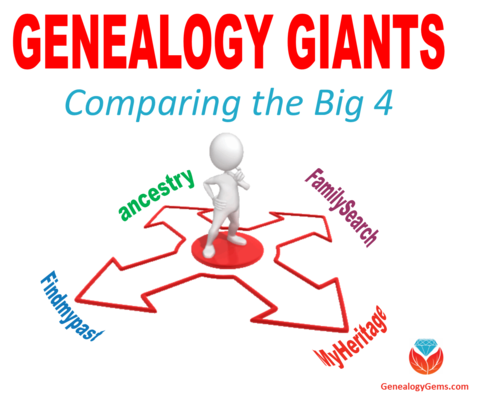 Genealogy Gems is your home for ongoing coverage and insight into the four ‘genealogy giants’ websites. Click here to learn more and to watch the RootsTech 2017 world premiere of my popular lecture that puts these big sites head-to-head. Genealogy Gems has published my ultimate quick reference guide, “Genealogy Giants: Comparing the 4 Major Websites.” It distills that hour-long lecture (and I was talking fast!) into a concise, easy-to-read format that will help you know which websites are best for you to use right now.
Genealogy Gems is your home for ongoing coverage and insight into the four ‘genealogy giants’ websites. Click here to learn more and to watch the RootsTech 2017 world premiere of my popular lecture that puts these big sites head-to-head. Genealogy Gems has published my ultimate quick reference guide, “Genealogy Giants: Comparing the 4 Major Websites.” It distills that hour-long lecture (and I was talking fast!) into a concise, easy-to-read format that will help you know which websites are best for you to use right now.
Disclosure: This article contains affiliate links and Genealogy Gems will be compensated if you make a purchase after clicking on these links (at no additional cost to you). Thank you for supporting the free Genealogy Gems podcast and blog!
New Genealogy Records Available Online April 15 – May 15, 2020
With so many new records coming online, I’m going to focus today on collections that are new, or have had a substantial update. These records are from around the world, and offer excellent opportunities to expand your genealogical research.
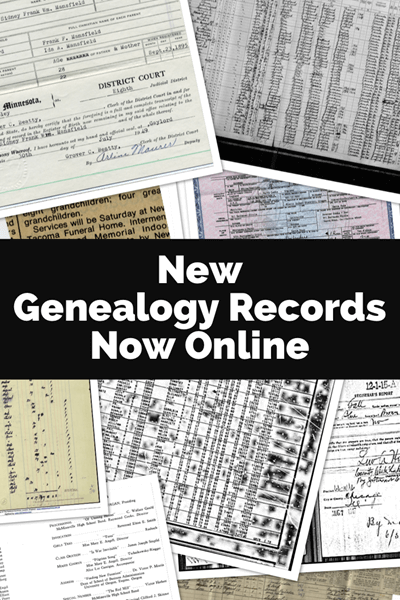
Keep reading here at Genealogy Gems for all the latest new records.
New Record Collections at FamilySearch
New indexed record collections offer new hope for genealogists yearning to bust a brick wall in their family tree. FamilySearch has recently launched several noteworthy new genealogical record collections. Some have substantial amounts of new records and some are just getting started. As always, they are free to access with an account. Here’s the latest:
England
England, Devon, Plymouth Prison Records, 1821-1919
Indexed Records: 13,495
Germany
Germany, Saxony, Church Book Indexes, 1500-1900
Indexed Records: 32,709
Ireland
Ireland, John Watson Stewart, The Gentlemen’s and Citizen’s Almanac, 1814
Indexed Records: 17,266
Norway
Norway, Oslo, Akershus Prison Records, 1844-1885
Indexed Records: 808
Peru
Peru, Piura, Civil Registration, 1874-1996
Indexed Records: 878
United States
California
California, Geographical and Name Index of Californians who served in WWI, 1914-1918
Indexed Records: 27,306
Hawaii
Hawaii, Hawaiian Islands Newspaper Obituaries, 1900-ca.2010
Indexed Records: 243
Maine
Maine, Alien Arrivals, 1906-1953
Indexed Records: 199,010
New Mexico
New Mexico Alien Arrivals, 1917-1954
Indexed Records: 17,240
Oregon
Oregon Death Index, 1971-2008
Indexed Records: 1,063,054
Oregon Divorce Index, 1991-2008
Indexed Records: 340,289
U.S. Newspapers
United States, GenealogyBank Historical Newspaper Obituaries, 1815-2011
Indexed Records: 1,827,447
Updated Records at FamilySearch
FamilySearch has also added indexed records to several interesting existing collections:
United States
United States, New York Land Records, 1630-1975
Indexed Records: 3,868,777
New York, Southern District, U.S District Court Naturalization Records, 1824-1946
Indexed Records: 103,000
Michigan, Detroit Manifests of Arrivals at the Port of Detroit, 1906-1954
Indexed Records: 323,121
Austria
Austria, Vienna, Jewish Registers of Births, Marriages, and Deaths, 1784-1911
Indexed Records: 27,317
Added indexed records to an existing collection comprising 1.8 million historical records.
Chile
Chile, Catholic Church Records, 1710-1928
Indexed Records: 8,575
Chile, Cemetery Records, 1821-2015
Indexed Records: 87,220
Italy
Italy, Benevento, Civil Registration (State Archive), 1810-1942
Indexed Records: 155,594
Italy, Brescia, Civil Registration (State Archive), 1797-1943
Indexed Records: 78,275
Italy, Salerno, Civil Registration (State Archive), 1806-1949
Indexed Records: 32,447
Images: 31,969
Peru
Peru, Diocese of Huacho, Catholic Church Records, 1560-1952
Indexed Records: 260,438
Venezuela
Venezuela, Archdiocese of Valencia, Catholic Church Records, 1760, 1905-2013
Indexed Records: 306,392
MyHeritage
MyHeritage, the leading global service for discovering your past and empowering your future, announced today the publication of three important Greek record collections:
- Greece, Electoral Rolls (1863–1924),
- Corfu Vital Records (1841–1932),
- and Sparta Marriages (1835–1935),
comprising 1.8 million historical records. Click here to start a 14-day free trial at MyHeritage.
This release constitutes the first substantial set of Greek record collections available on MyHeritage. All three collections have been indexed by MyHeritage and for the first time are now searchable in English, as well as in Greek. The total size of MyHeritage’s historical record database is now 12.2 billion records. This release positions MyHeritage as an invaluable genealogy resource for family history enthusiasts who have Greek roots.
“As the cradle of western civilization and a crossroads of continents and cultures, Greece is becoming a gem among MyHeritage’s historical record collections. The records in these collections are rich in detail and have pan-European, Balkan, and Mediterranean significance. The communities documented were shaped by Greek, Italian, French, and Russian influences, have been home to significant Catholic and Jewish communities, and represent some of the world’s most progressive systems of governance. These collections will prove valuable both to novice researchers and experienced genealogists,” said Russ Wilding, Chief Content Officer of MyHeritage.
The publication of these collections furthers MyHeritage’s commitment to providing new avenues for Greek family history research. In one of the company’s pro bono initiatives, MyHeritage Founder and CEO Gilad Japhet personally traced the descendants of a Jewish family that was hidden during World War II on the small island of Erikoussa, north of Corfu. The entire population of the island collectively gave refuge to the family, and saved it from death. His genealogical detective work, combined with MyHeritage’s extensive global database of historical records, culminated in recognition for the courageous people of Erikoussa, who were presented with the House of Life award by the Raoul Wallenberg Foundation. This was depicted in the books ‘When the Cypress Whispers’ and ‘Something Beautiful Happened’ by Yvette Manessis Corporon, whose grandmother was among those who saved the Jewish family on Erikoussa.
Japhet utilized his hands-on experience in Greek research to develop the enhanced method by which MyHeritage now handles Greek surnames in the new collections. In Greece, a woman’s last name is the genitive form of her father’s surname, or when she marries, of her husband’s surname. The new Greek collections on MyHeritage have been made gender-agnostic so that searches and matches will work to the fullest extent. For example, a search for the Jewish surname “Velleli” in the new collections on MyHeritage will also locate people named “Vellelis”. It is also possible to find these surnames by searching for “Belleli”, because the Greek letter beta is pronounced like the English letter V, but in some countries this distinction has been lost and Greek surnames are sometimes pronounced with the letter B, the way they are written in modern English. MyHeritage’s Global Name Translation Technology further ensures that when searching on MyHeritage in other languages, such as Hebrew and Russian, the results will also include names in the new Greek collections. No other major genealogy company has these Greek record collections, nor such sophisticated algorithms customized for Greek genealogy research.
The Greece Electoral Rolls (1863–1924) consist of 1,006,594 records and provide nationwide coverage of males ages 21 and up who were eligible to vote. They list the voter’s given name, surname, father’s name, age, and occupation. Each record includes the individual’s name in Greek, and a Latinized transliteration of the name that follows the standard adopted by the Greek government. MyHeritage translated many of the occupations from Greek to English and expanded many given names, which are often abbreviated in the original records. This new collection includes scans of the original documents and is the most extensive index of Greek electoral rolls currently available anywhere.
The Corfu Vital Records (1841–1932) consist of 646,807 birth, marriage, and death records. The records were collected by the civil authorities in Corfu and document the life events of all residents of the island regardless of their ethnicity or religion. Birth records from this collection may contain the child’s given name and surname, birthdate and place of birth, name and age of both parents, and the given names of the child’s grandfathers. A marriage record from this collection may include the date of marriage, groom’s given name and surname, age, place of birth, residence, and his father’s name. Similar information is recorded about the bride and her father. Death records in this collection may include the name of the deceased, date of death, age at death, place of birth, residence, and parents’ names. The indexed collection of Corfu Vital Records includes scans of the original documents and is available exclusively on MyHeritage.
The Sparta Marriages collection (1835–1935) consists of 179,411 records which include images of the couple’s marriage license and their listing in the marriage register. The records in this collection list the full names of the bride and groom, the date of marriage, their fathers’ names, the birthplace of the bride and groom, and occasionally the names of witnesses to the marriage. The images in this collection were photographed, digitized, and indexed by MyHeritage from the original paper documents, in cooperation with the Metropolis of Monemvasia and Sparta.
The new collections are available on SuperSearch™, MyHeritage’s search engine. Searching the Greek record collections is free. A subscription is required to view the full records and to access Record Matches. Click here to start a 14-day free trial at MyHeritage.
Ancestry
Alabama
Alabama, Episcopal Diocese of Alabama, Church Records, 1837-1970
From Ancestry: “This collection includes baptism, marriage, and burial records from the Episcopal Diocese of Alabama between the years of 1837 and 1970. Established in 1830, the Episcopal Diocese of Alabama is comprised of 92 congregations and covers all of Alabama, with the exception of the very southern portion of the state.”
Click here to search this collection.
Oregon
Oregon, State Marriages, 1906-1966
The original data comes from the Oregon State Archives. Oregon, Marriage Records, 1906-1910, 1946-1966. Salem, Oregon.
Click here to search this collection
Oregon, State Births, 1842-1917
These birth certificates will typically include the following information:
- Name of child
- Gender and race of child
- Date and place of birth
- Father’s name
- Father’s birth place and age
- Mother’s name
- Mother’s birth place and age
Click here to search this collection
Pennsylvania
U.S., Pennsylvania, Grand Army of the Republic Membership Records, 1865-1936
These records are made available through a partnership with FamilySearch. The describe the collection as follows: “Index and images of membership records of the Pennsylvania Department Grand Army of the Republic that cover from the years 1865-1936. An organization of Union army and navy veterans of the Civil War. The collection consists of registers, lists, minute, account and descriptive books of local post (chapters) The descriptive books include town of residence, military unit, date of enlistment,date of discharge, age and birthplace. The collection was acquired from the Pennsylvania State Archives.”
Click here to search the collection.
Washington
WEB: Washington, Various County Census Records, 1850-1914
The original data for this collection comes from the Washington State Archives – Digital Archives. Census Records. Cheney, Washington, United States: Washington State Archives – Digital Archives.
Click here to search the collection.
Finland
Finland, WWII Military Casualties, 1939-1945
In this collection you will find details on Finnish soldiers killed during World War II. From Ancestry: “From the start of the war until 1944, Finland was involved in battles with the Soviet Union and from 1944-1945, Nazi Germany. Altogether, nearly 95,000 Finnish soldiers were killed or declared missing in action.” The National Archives of Finland created these indexes. They are in Finnish, reflecting the original source material.
Click here to search this collection
Germany
Germany, Military Killed in Action, 1939-1948
Notes about this collection from Ancestry: “This collection is searchable using the search form, which among other things allows you to search by Last Name, First Name, Birth Date, Birthplace, Date of Death and Place of Death. Under “Browse this collection,” you can select the Box Number Range and Box Number of the cards desired.”
Click here to search the collection.
German Concentration Camp Records, 1946-1958
These records include copies of German records including camp records, transport lists, and medical data cards. The camp records include inmate cards, death lists, and strength reports.
Click here to search this collection
Updated Records at Ancestry:
New York
New York, Passenger and Crew Lists (including Castle Garden and Ellis Island), 1820-1957
Click here to search this collection
New York, Executive Orders for Commutations, Pardons, Restorations, Clemency and Respites, 1845-1931
39,246 new records have been added to this collection of executive clemency application ledgers and correspondence.
According to Ancestry: “Each record includes the felon’s name, crime, date and county of conviction, sentence, and prison. Signatures on the records can include the governor, secretary of state, and/or deputy secretary of state.”
Click here to search the collection.
North Dakota
North Dakota, Select County Marriage Records, 1872-2017
30,266 new records were added for the following counties in Washington State: Adams, Cavalier, Hettinger, McIntosh, Nelson, and Pierce.
Search Tips from Ancestry:
- This collection includes images of indexes as well as the actual marriage records. If you’re having trouble finding your ancestor through the search, try browsing the index for the county in which they lived and use that information to locate them in the actual records.
- Don’t overlook the possibility that your ancestor may have been married in a nearby county that was more convenient to them, or where other family members lived.
Click here to search this collection
Tennessee
Tennessee, Death Records, 1908-1965
This is a significant update with 1,019,533 new records added covering 1959-1965. Be aware that, according to Ancestry, the forms used for reporting deaths 1908-1912 contain far less information than those used from 1914 forward. “No death records were recorded by the State of Tennessee in 1913 due to a change in the state law requiring vital records registration.”
Click here to search this updated collection.
More Genealogy for You
Join me for Elevenses with Lisa, the online video series where we take a break, visit and learn. In the episode below I share viewers’ family history displays, answer your questions about my genealogy organization method, and show you how I file my genealogy digital files. Click here for the episode show notes.
Genealogy Gems Podcast Episode 231
Genealogy Gems Podcast Episode 231
with Lisa Louise Cooke
July 2019
Listen now, click player below:
In this episode:
- The latest tech news from Google Earth, FamilySearch and MyHeritage
- Alice’s Story – genealogy research with blogger Julianne Mangin
- Cemeteries – both for ancestors and their pets
Please take our quick PODCAST SURVEY which will take less than 1 minute. Thank you!
NEWS:
Google Earth News
Jennifer in California sent me a fascinating item recently , and she says “Thought you might get a kick out today’s blurb from Google, where they pat themselves on the back for what can be done with Google Earth. No argument from me; it’s amazing!”
So, what can be done with Google Earth besides all the family history projects that I teach here on the podcast and in the Premium videos? Well, Peter Welch and Weekend Wanderers in the UK are using Google Earth to find treasure!
Read all about it here
Visit the Weekend Wanderers website
FamilySearch Adds Audio
FamilySearch.org, the free and massive genealogy website from the Church of Jesus Christ of Latter-day Saints has added a new way for you to add more memories to your tree.
In addition to photos you can now add audio both at the website and the FamilySearch FamilyTree and Memories apps which you can download from your mobile device’s app store.
So now as you’re selecting and uploading family photos to familysearch, you can also gather and record the stories that go with those photos. It’s sort of like being able to write on the back on the photograph, but in an even more personal way.
Your voice, and the voices of your relatives can now be part of your family’s history.
Read the article about adding audio
From the FamilySearch website: “Photos and audio attached to deceased ancestors can be viewed by other users on the FamilySearch Family Tree. To protect privacy, photos and audio attached to living people can be seen only by the person who added the memory unless that person shares the memory or album with another user.”
MyHeritage App update
Among the newly introduced features are Family Timelines, the ability to view family trees that you’re matched with, the ability to choose which information you extract from Smart Matches™, an improved research page, and more. Read all about it here
MAILBOX:
We received lots of great feedback on the article 3 Shocking Discoveries I’ve Made While Searching Cemeteries by Joy Neighbors
From Craig: “After finding my Paternal grandfather and great-grandfather, I looked for my Paternal GG Grandfather in the same area. No luck. I went to the R.B. Hayes library in Tiffin, Ohio and started looking at every page in the burial listing for the township I thought he would be in. And there he was – last name misspelled! (The “A” was changed to a “K”.) I was able to drive over to the cemetery and located his stone – still readable after his burial in 1885. I plan to go back to the area this summer to look for his wife, who was buried elsewhere (they were separated.) I wish I could get someone to update the lists with the correct spelling, to match the gravestone and census papers, but that seems impossible to do.”
From Ann:
“My brother Ray says we have visited more dead relatives than live ones. Trying now to visit the relatives above ground!”
From LeRoy:
Spent many hours walking, crawling, pushing through brush brambles and briers just to find and take pictures of tombstones. I regret only one such adventure. If I may. My sweetheart and I went to a small cemetery in New Jersey to gather family names and pictures for Billion Graves and our personal records. While I was taking pictures, my wife was clipping brush and bushes from the stone that identified her families plot.
We had a great day. I filled two clips of pictures and my sweetheart did a magnificent job on that stone. It was only a few hours later, when she started itching that I really “looked” at the pictures and realized that the brush that she cleared from that stone was poison ivy. Wouldn’t have been so bad, but when she found that I’m not affected by poison oak, ivy or sumac. She was not happy.
From Shirley:
I have recently started doing ancestry research and have been astounded at what I have found. No creepy tree stories. However, it is nice to know that some ancestors took special care to by buy family plots even though they knew eventually the girls might marry and want to be buried with their husband. I found it interesting that both my grandfather and my grandmother are both buried with their individual parents.
From Patsy:
Shirley’s story jogged my memory. My mother died in 1934 when I was 4 years old. She is buried in her father’s plot rather than my paternal grandfather’s plot. I have wondered for years why the burial was arranged that way and imagine all sorts of situations. Were the families feuding? Was one family more financially able to foot the bill. Did my paternal grandfather not like my father? Hmmmm………
From Sharon:
I checked out this book from the local library about a month ago. Decided I needed my own copy. All genealogist should read it. It is very informative & entertaining.
From Marinell:
About 5 years ago I found the farm on which my gr great grandparents were buried. The tall granite marker with the parents’ names had been knocked over, the foot stones stacked and several large rocks were around the monument and it was in the middle of a field that was being planted and harvested. We made contact with the owner and received permission to have it raised.
In the meantime, I found an obituary for a son who was buried on the family farm. I also found an article about a woman who did dowsing, contacted her and she agreed to come perform the dowsing. I was videoing it when my phone went totally dead! I had never had that happen and it was charged. Thirty minutes later it came back on mysteriously!
She found 2 adult women, 2 adult men and three toddlers. After further search I found another obituary for a grown daughter buried there and 3 toddler grandchildren who died in 1882. She said that the large rocks would have marked the graves. Sadly, they had totally desecrated the family cemetery. But I was excited to learn all I did and was startled by the phone totally dying.
The free podcast is sponsored by RootsMagic
 GEM: Genealogy Research with Julianne Mangin
GEM: Genealogy Research with Julianne Mangin
We first talked to Julianne last year in Genealogy Gems Podcast episode 219. In that episode we explored the tragic story of Julianne’s ancestors, the Metthe family. It was a riveting case study of the twists and turns that genealogy can take us on.GEM: Checking in with Julianne Mangin
Julianne had originally been a bit of a reluctant genealogist. But after a 30 year career in library science, including 14 years as a librarian and website developer for the Library of Congress in Washington DC, she could couldn’t help but try to find the truther in the piecemeal stories that she was told by her mother.
Julianne has continued to research and write at her Julianne Mangin blog, and I thought it would fun to check back in with her and see what she’s been up to.
Her latest blog series is called Alice’s Story. It follows the path of discovery she followed to uncover the story of a previously unknown aunt.
- Alice’s Story Part 1
- Alice’s Story Part 2 – the Exeter School
- Alice’s Story Part 3 – Final Resting Place
The research began where most good genealogical research begins: at the end of Alice’s life and her death certificate.
Institutional Records – But with few records and no first-hand interviews available, Julianne turned to researching the institutions themselves to dig deeper into Alice’s experience.
Resource:
Genealogy Gems Premium Video: Institutional Records (membership required)
State Census Records can help fill in the gaps between the federal census enumerations. Search for “state census” in the card catalog:
The free podcast is sponsored by MyHeritage
Resource:
State Censuses at the FamilySearch Wiki
“Copies of many state censuses are on microfilm at the Family History Library. The Family History Library’s most complete collections of state censuses are for Illinois, Iowa, Kansas, Massachusetts, Minnesota, Mississippi, New Jersey, New York, Rhode Island, and Wisconsin. However, censuses exist for the following states also:
Arizona, Arkansas, California, Colorado, Delaware, District of Columbia, Florida, Georgia, Hawaii, Indiana, Louisiana, Maine, Maryland, Michigan, Missouri, Nebraska, Nevada, New Mexico, North Carolina, North Dakota, Oklahoma, Oregon, Rhode Island, SouthCarolina, SouthDakota, Tennessee, Texas, Utah,
Virginia, Washington and Wyoming.
State, colonial, and territorial censuses at the Family History Library are listed in the Place Search of the FamilySearch Catalog under “STATE – CENSUS RECORDS”
Old Postcards are a great resource for images.
Resources:
Genealogy Gems Premium Podcast episode 16 and episode 76 feature strategies for finding family history on ebay. (Genealogy Gems Premium Membership required)
Become a Genealogy Gems Premium eLearning Member
Gain access to the complete Premium podcast archive of over 150 episodes and more than 50 video webinars, including Lisa Louise Cooke’s newest video The Big Picture in Little Details.
Learn more here
Institutional Annual Reports – Julianne searched for annual reports to the Legislature for more details on the various institutions where Alice resided.
Resources:
Library of Congress Catalog
WorldCat.org
Google Books
Old Newspapers offered a counterbalance to the annual reports.
Resources:
Genealogybank
Newspapers.com
MyHeritage
“The institutions were like characters in the story.”
Also mentioned in this interview:
The Rhode Island Historic Cemetery Commission
Julianne’s Pet Cemetery Stories blog
Rags, War Hero
You worked really hard on your family history – protect it with the Cloud backup service that Lisa uses: Backblaze.com/Lisa
Download the Show Notes PDF in the Genealogy Gems Podcast app.

